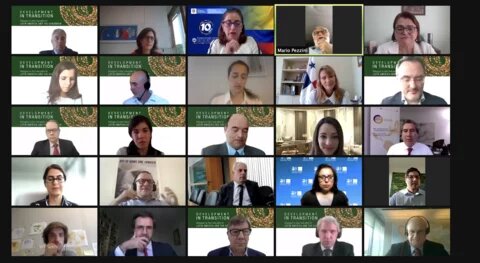The EU-LAC Foundation, together with the OECD Development Centre, ECLAC and DG INTPA of the European Commission, the Fundación Euroamérica, the Inter-American Development Bank, SEGIB and the Fundación Carolina invited to the webinar "Forging Regional and International Partnerships for the Post-COVID World" in the framework of the Development in Transition Days.
The workshop delved into relevant experiences of international financing, regional and international coordination, capacity building and knowledge sharing to understand the context and prospects of future cooperation in and with the region. This discussion placed a special focus on exchanges between the European Union and Latin America and the Caribbean in their efforts to build their individual and collective futures in the post-COVID-19 world. This first workshop was hosted to drive a comprehensive discussion on the international partnerships needed to collectively ensure inclusive and sustainable recovery and development paths in Latin America and the Caribbean.
The Executive Director of the EU-LAC Foundation, Dr Adrián Bonilla moderated the first panel of the workshop “Building partnerships for a green recovery: the potential for employment creation“, which counted with presentations from Luis Fierro (Vice Minister of Economy, Ecuador), Mariano Morazzo (Head of Energy Transitions and Natural Resources Department, ENEL Americas), Kristin Lang (Head of Division, LAC, European Investment Bank), Andrew Scyner (INTPA, LAC Regional Programmes, EUROCLIMA+, European Commission) and Sandra Guzman (Coordinator, Climate Finance Group of Latin America and the Caribbean).
The participants had an enriching discussion on the requirements, advantages and challenges of interregional associations that generate public policies to break down the structural asymmetry of existing global economic cooperation. They exchanged priorities and innovations of cooperation that recognizes more than just financial contributions as essential for valuable associations and identified elements that favour employment creation in times of post-pandemic recovery. In doing so, they introduced exemplary national development plans and financing instruments, as well as best practices for indispensable public-private partnerships for the restructuring of the economic system.
During this workshop, additional breakout sessions about the topics of "Innovation in financing: new instruments for cooperation", "Co-operation in CT&I for knowledge-based regional value chains", "Digital transformation for a more inclusive and efficient recovery", and "Social cohesion: rethinking the welfare state in LAC" took place. Those present agreed on the need to stronger emphasize EU-LAC cooperation in order to advance green recovery policies on a global scale, safeguarding major participation of all stakeholders and countries in transition. They also emphasized the great opportunity of Latin America and the Caribbean and the European Union to shape global actions towards Agenda 2030 and beyond in order to mitigate this economic crisis.
